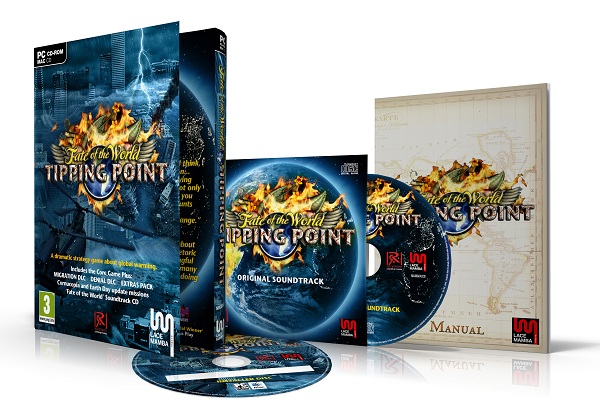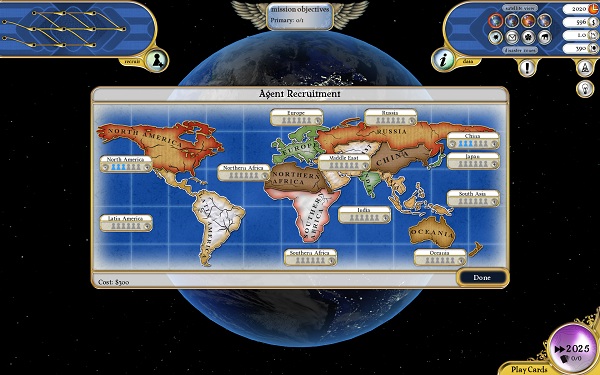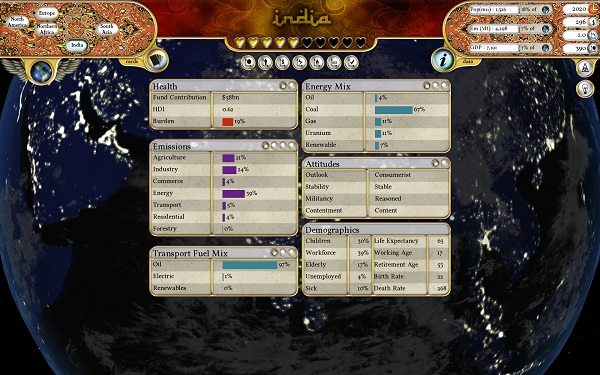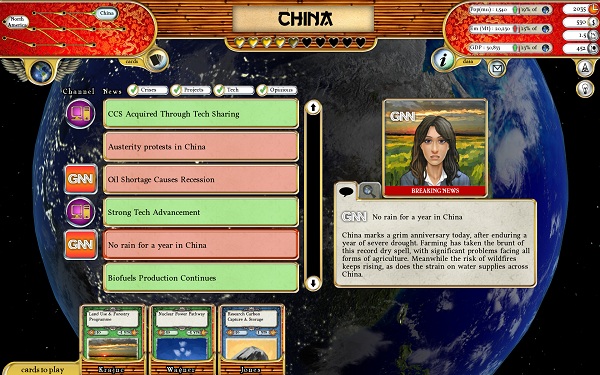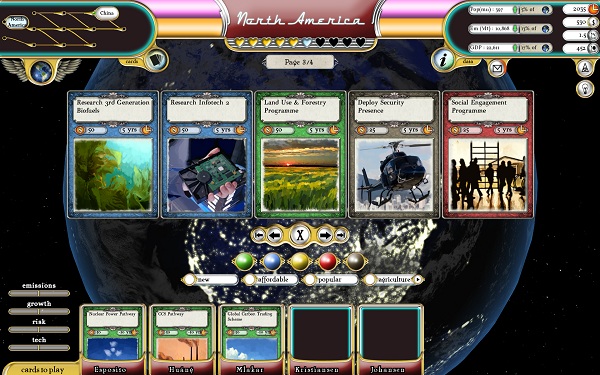Everyone wants to change the Fate of the World, and Red Redemption has proven that it is no easy feat in their global warming strategy simulation. Based on scientific research, Fate of the World puts you at the helm of the Global Environmental Organisation (GEO) set up in a fictional future to combat the growing fears that our world is headed downhill. Well it’s a pretty bumpy ride, and your world will be full of risky decisions and compromises, unfortunately, we cannot all live happily ever after.
The game works off of a very simple card based system; with 12 regions around the world, you can buy-in card slots through recruiting agents, each agent allows you to play a policy card per turn. With the possibility of up to five agents per region, and twelve regions per scenario you can purchase 60 slots which with to ‘save’ the world. However it’s not that easy, and when you truly get into it, you will find that you have to save all of your hard earned funding for the actual policies themselves, unfortunately merely throwing money at problems does not work.
This is where offices come into play, you cannot start improving the welfare of India without building a welfare office, likewise if you wish to begin researching new technologies, expand energy outlets or strive for environmental protection. Without investing in offices, you’ll shortly find that 100 years in the future, riots are taking place in reaction to the global market crash, and with no political office, you are rendered helpless at keeping your regions under control.
The policies themselves make up well over 50 cards, and playing the right ones at the opportune times will be the difference between a region spiralling into anarchy, or finding a way to improve their quality of life for years to come. Of course to ask you to determine exactly what each country needs is a big decision, and so regional news will tell you of the current trends going on, what the people are begging for, and the disasters that run rampart globally. Play it ignorantly and you’ll soon find that horrific occurrences begin to literally spread like wildfire.
Now even in 2020, the world still unsurprisingly runs on money, so changing the world is not cheap, and everything comes at a cost. The GEO receives all its funding from countries around the world, if they do not feel that you are adequately spending their money they’ll drop their funding. If you are unable to help the rise in unemployment in regions you’ll find that their GDP will fall, or worse yet, a global crisis may see the markets crash, and you are going to be very strapped for cash. However, keep your regions happy and your funding will sky rocket, however this is no tycoon game, this is a serious simulation, and you cannot simply bank your money in preparation for an ailing future, any money not spent is wasted.
Hidden beneath the beautifully simplistic and pick-up-and-play card game is a torrent of stats, graphs and figures that summarise the current state of the twelve regions all funding the GEO in the hope for a better future. If you can get your head around them, reading the trends can predict specifically what will change India from an impoverished region to an enriched powerhouse.
Once you’ve made your decisions for the lives of millions of innocent people, or simply run out of money, you can play your policies to see how they pan out, each turn lasts 5 years like most policies, however some cards may continue to be played until you either dismiss them, or they no longer serve a purpose. Most cards may only take up one turn on a slot, but you will not see the rewards for many years to come, it is attempting to predict the changes that will take place that is the most unpredictable and challenging part of Fate of the World.
It is not an easy task to change the fate of the world, and this is what the game shows us, if we want to change our future from the terrifying nightmare that the world escalates into in 2200 we cannot just sit around; countries will not just ebb and flow according to what one company dictates. Try and change a nation from the same task it has been doing for the past 200 years, it's not easy. In the end you will ultimately become frustrated at why the world does not work the way you think it should, and why one policy cannot simply change the living standards of a region in 5 years.
It is our own ignorance that is the downfall, and Red Redemption have proven that they can attempt to educate in one of the world’s most accepted forms of media. The scenarios are difficult, and there is a real learning curve in realising exactly what will benefit the world, and in what way. Thankfully you are not just left in the dark, and with a handy Encyclopedia any terms or practices that you are unacquainted with, can be explained in the simplest terms for your own benefit, it won't however tell you how to fix the world's problems.
You are eased into the simulation with the Rise of Africa that gives you a simple task; ensure that Africa’s Human Development Index (HDI) is greater than 0.7 in five turns (25 years), both regions start at just under 0.6, and you are introduced to the basic concepts of the game, and how to improve a country’s HDI, and why improving a country’s Gross Domestic Product (GDP) is just as important.
Unfortunately, flying high off the success of bringing Africa’s quality of life up, you are thrown in the deep end with subsequent missions where you will learn that there is more to just welfare to improving the future of the state of the world, especially with many scenarios taking place over a century, rather than the 25 year cake walk it takes to improve two regions.
The other scenarios take place in the ‘real world’ with all twelve regions looking to you for change, you need to strategically keep everyone happy, whilst attempting to improve the likelihood of a possible future, now do all this and juggle the stability of regions locked in panic whilst energy sources run out, and the global temperature steadily rises. However despite the rising risks, and obstacles that you come against, you will find yourself trying scenarios again and again.
The scenarios are definitely challenging, and the learning curve on them can be quite steep until you learn the advantages of certain policies, and know how to begin shaping the future in the first few turns. Do not let the guise of a card game turn you away from this turn based strategy, even if you do not believe in climate change, this is one game that will make you think about what the consequences of your actions could be.
Fate of the World in an uncompromising look at the future of our world, and takes its subject matter deadly seriously, with the stigma of a serious game many may turn away, and yet it is just as engrossing and more so than any other strategy title sat on your shelf. Red Redemption have delivered a dreadfully frightening future with such a delightfully simple card based game, just be prepared to watch the downfall of the human race.
The retail version of Fate of the World: Tipping Point released by Lace Mamba Global gives you the standard five missions alongside the Tipping Point expansion that gives you four new DLC missions; Denial, Migration, Cornucopia and Earth Day, as well as the beautiful soundtrack composed by the legendary Richard Jacques, and is available in all good stores for £19.99. If you want a strategy that is grounded in a realistic setting Fate of the World is just the dystopian nightmare that you’re looking for.
